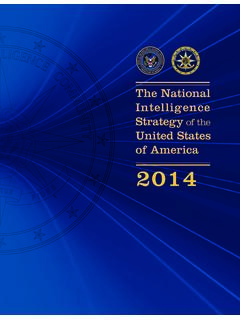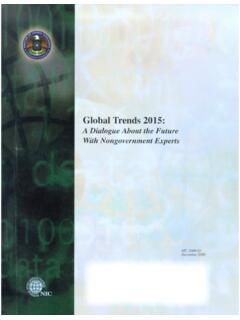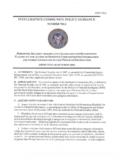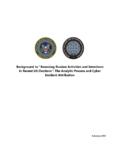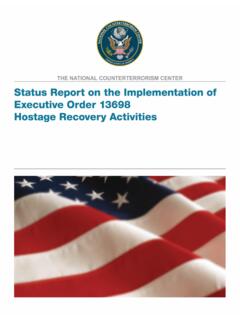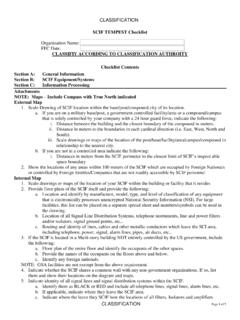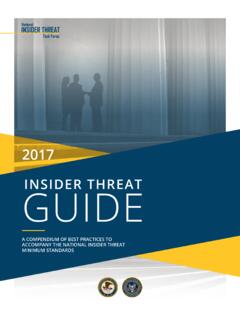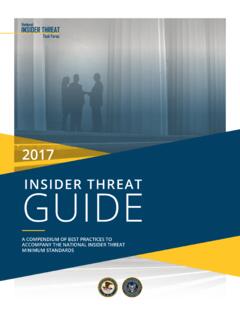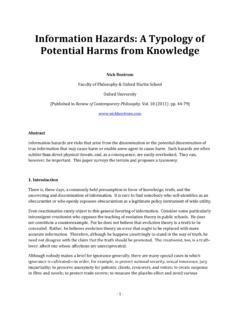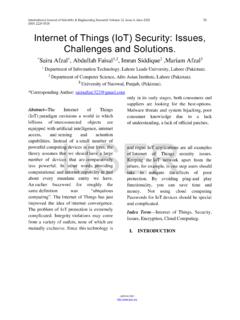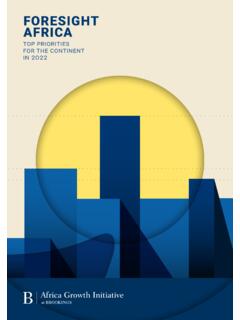Transcription of Climate Change and International Responses Increasing ...
1 Climate Change and International Responses Increasing Challenges to US National Security Through 2040 NIC-NIE-2021-10030-A [ i ] Key Judgment 1: Geopolitical tensions are likely to grow as countries increasingly argue about how to accelerate the reductions in net greenhouse gas emissions that will be needed to meet the Paris Agreement goals. Debate will center on who bears more responsibility to act and to pay and how quickly and countries will compete to control resources and dominate new technologies needed for the clean energy transition. Most countries will face difficult economic choices and probably will count on technological breakthroughs to rapidly reduce their net emissions later.
2 China and India will play critical roles in determining the trajectory of temperature rise. Key Judgment 2: The Increasing physical effects of Climate Change are likely to exacerbate cross-border geopolitical flashpoints as states take steps to secure their interests. The reduction in sea ice already is amplifying strategic competition in the Arctic over access to its natural resources. Elsewhere, as temperatures rise and more extreme effects manifest, there is a growing risk of conflict over water and migration, particularly after 2030, and an Increasing chance that countries will unilaterally test and deploy large-scale solar geoengineering creating a new area of disputes. Key Judgment 3: Scientific forecasts indicate that intensifying physical effects of Climate Change out to 2040 and beyond will be most acutely felt in developing countries, which we assess are also the least able to adapt to such changes.
3 These physical effects will increase the potential for instability and possibly internal conflict in these countries, in some cases creating additional demands on US diplomatic, economic, humanitarian, and military resources. Despite geographic and financial resource advantages, the United States and partners face costly challenges that will become more difficult to manage without concerted effort to reduce emissions and cap Takeaway We assess that Climate Change will increasingly exacerbate risks to US national security interests as the physical impacts increase and geopolitical tensions mount about how to respond to the challenge. Global momentum is growing for more ambitious greenhouse gas emissions reductions, but current policies and pledges are insufficient to meet the Paris Agreement goals.
4 Countries are arguing about who should act sooner and competing to control the growing clean energy transition. Intensifying physical effects will exacerbate geopolitical flashpoints, particularly after 2030, and key countries and regions will face Increasing risks of instability and need for humanitarian assistance. As a baseline, the IC uses the US Federal Scientific community s high confidence in global projections of temperature increase and moderate confidence in regional projections of the intensity of extreme weather and other effects during the next two decades. Global temperatures have increased C since pre-industrial times and most likely will add C to reach C around 2030.
5 The IC has moderate confidence in the pace of decarbonization and low to moderate confidence in how physical Climate impacts will affect US national security interests and the nature of geopolitical conflict, given the complex dimensions of human and state decisionmaking. Climate Change and International Responses Increasing Challenges to US National Security Through 2040 [ ii ] Scope Note This National Intelligence Estimate (NIE) is in response to a Presidential tasking to assess the national security impacts of Climate Change . While Climate Change effects are forecast to intensify in the latter half of the 21st century and continue well beyond 2100, based on current emissions trends and technologies, this NIE assesses the near- (5 10 years) and medium-term (10 20 years) geopolitical implications abroad we do not assess impacts to the homeland or DOD facilities.
6 We assume the following during the next 20 years: No precipitating world event that would devastate industrial activity will occur that sharply and permanently reduces greenhouse gas emissions. The scientific content of this NIE, both the observed Climate effects to date and the modeled future impacts, were reviewed by the US Federal science agencies on the Climate Security Advisory Council (CSAC). The CSAC is a partnership between the IC and the Federal science community established by Congress to better understand and anticipate the ways Climate Change affects US national security interests. It includes the Environmental Protection Agency, the Department of Energy, the Department of the Interior/US Geological Survey, the Office of Naval Research, the National Aeronautics and Space Administration, the National Oceanic and Atmospheric Administration, and the National Science Foundation.
7 The IC relies on the broad consensus of scientific studies, modeling, and forecasts from the Intergovernmental Panel on Climate Change , the US National Climate Assessment, and US Federal science agencies as the baseline to assess the geopolitical implications of Climate Change . We are aware of, but in this estimate do not rely on, the small minority scientific perspectives on Climate Change ranging from those who consider it nonexistent to those who view it as a near-term existential threat to humanity. Confidence Levels The IC uses as a baseline the US Federal scientific community s high confidence in global projections of temperature increase and moderate confidence in regional projections of the intensity of extreme weather and other effects during the next two decades.
8 The IC has moderate confidence in the pace of decarbonizing the energy sector, given how historically entrenched and slow moving energy systems have been to Change and the difficulty of predicting technological breakthroughs. Our confidence decreases after 2030 because government and private sector policies and investments have the potential to drive a more rapid transition. The IC has low to moderate confidence in assessing how Climate Change effects could cascade in ways that affect US national security interests as well as the timing and location of potential geopolitical tension, given the complex dimensions of human and state decisionmaking and the challenge of connecting Climate , weather, and sociopolitical models.
9 [ 1 ] Discussion Reports from US Federal science agencies and the Intergovernmental Panel on Climate Change (IPCC) indicate that the burning of fossil fuels has increased the concentration of greenhouse gases in the atmosphere and raised global average surface temperatures about degrees Celsius ( C) over pre-industrial levels. Temperature rise has accelerated, and every decade since the 1960s has been hotter than the previous one, according to the National Aeronautics and Space Administration. International diplomatic efforts since the late 1980s have centered on understanding and mitigating the effects a changing Climate poses to human security. The 2015 Paris Agreement for the first time established a global goal of limiting temperature rise to well below 2 C above pre-industrial levels and pursuing efforts to limit the temperature increase to C by 2100, concluding that this would significantly reduce the risks and impacts of Climate Change .
10 US Government and other scientists argue that the risks grow as the temperature rises and could be catastrophic and nonlinear after 2 C if there are tipping points in the Earth s system. (See Annex B.) In the Paris Agreement, more than 190 countries agreed to submit updated plans known as Nationally Determined Contributions (NDC) every five years that should outline increased commitments to peak and reduce their emissions. NDCs are voluntary and have no enforcement mechanism for non-compliance. Developing countries which have long argued that they should not have to limit emissions because they were late in industrializing, need to use fossil fuels to grow economically, and have historically emitted fewer greenhouse gases signed on to the Paris Agreement in part because it did not require country-specific emissions reduction targets.
